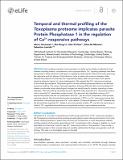| dc.contributor.author | Herneisen, Alice L | |
| dc.contributor.author | Li, Zhu-Hong | |
| dc.contributor.author | Chan, Alex W | |
| dc.contributor.author | Moreno, Silvia NJ | |
| dc.contributor.author | Lourido, Sebastian | |
| dc.date.accessioned | 2022-12-16T17:45:14Z | |
| dc.date.available | 2022-12-16T17:45:14Z | |
| dc.date.issued | 2022-08-17 | |
| dc.identifier.uri | https://hdl.handle.net/1721.1/146901 | |
| dc.description.abstract | <jats:p>Apicomplexan parasites cause persistent mortality and morbidity worldwide through diseases including malaria, toxoplasmosis, and cryptosporidiosis. Ca<jats:sup>2+</jats:sup> signaling pathways have been repurposed in these eukaryotic pathogens to regulate parasite-specific cellular processes governing the replicative and lytic phases of the infectious cycle, as well as the transition between them. Despite the presence of conserved Ca<jats:sup>2+</jats:sup>-responsive proteins, little is known about how specific signaling elements interact to impact pathogenesis. We mapped the Ca<jats:sup>2+</jats:sup>-responsive proteome of the model apicomplexan <jats:italic>Taxoplasma gondii</jats:italic> via time-resolved phosphoproteomics and thermal proteome profiling. The waves of phosphoregulation following PKG activation and stimulated Ca<jats:sup>2+</jats:sup> release corroborate known physiological changes but identify specific proteins operating in these pathways. Thermal profiling of parasite extracts identified many expected Ca<jats:sup>2+</jats:sup>-responsive proteins, such as parasite Ca<jats:sup>2+</jats:sup>-dependent protein kinases. Our approach also identified numerous Ca<jats:sup>2+</jats:sup>-responsive proteins that are not predicted to bind Ca<jats:sup>2+</jats:sup>, yet are critical components of the parasite signaling network. We characterized protein phosphatase 1 (PP1) as a Ca<jats:sup>2+</jats:sup>-responsive enzyme that relocalized to the parasite apex upon Ca<jats:sup>2+</jats:sup> store release. Conditional depletion of PP1 revealed that the phosphatase regulates Ca<jats:sup>2+</jats:sup> uptake to promote parasite motility. PP1 may thus be partly responsible for Ca<jats:sup>2+</jats:sup>-regulated serine/threonine phosphatase activity in apicomplexan parasites.</jats:p> | en_US |
| dc.language.iso | en | |
| dc.publisher | eLife Sciences Publications, Ltd | en_US |
| dc.relation.isversionof | 10.7554/elife.80336 | en_US |
| dc.rights | Creative Commons Attribution 4.0 International license | en_US |
| dc.rights.uri | https://creativecommons.org/licenses/by/4.0/ | en_US |
| dc.source | eLife | en_US |
| dc.title | Temporal and thermal profiling of the Toxoplasma proteome implicates parasite Protein Phosphatase 1 in the regulation of Ca2+-responsive pathways | en_US |
| dc.type | Article | en_US |
| dc.identifier.citation | Herneisen, Alice L, Li, Zhu-Hong, Chan, Alex W, Moreno, Silvia NJ and Lourido, Sebastian. 2022. "Temporal and thermal profiling of the Toxoplasma proteome implicates parasite Protein Phosphatase 1 in the regulation of Ca2+-responsive pathways." eLife, 11. | |
| dc.contributor.department | Massachusetts Institute of Technology. Department of Biology | en_US |
| dc.relation.journal | eLife | en_US |
| dc.eprint.version | Final published version | en_US |
| dc.type.uri | http://purl.org/eprint/type/JournalArticle | en_US |
| eprint.status | http://purl.org/eprint/status/PeerReviewed | en_US |
| dc.date.updated | 2022-12-16T17:39:24Z | |
| dspace.orderedauthors | Herneisen, AL; Li, Z-H; Chan, AW; Moreno, SNJ; Lourido, S | en_US |
| dspace.date.submission | 2022-12-16T17:39:30Z | |
| mit.journal.volume | 11 | en_US |
| mit.license | PUBLISHER_CC | |
| mit.metadata.status | Authority Work and Publication Information Needed | en_US |
